| Construction Rating: | starstarstarstarstar |
| Flight Rating: | starstarstarstarstar_border |
| Overall Rating: | starstarstarstarstar_border |
| Published: | 2012-06-04 |
| Manufacturer: | Clone |
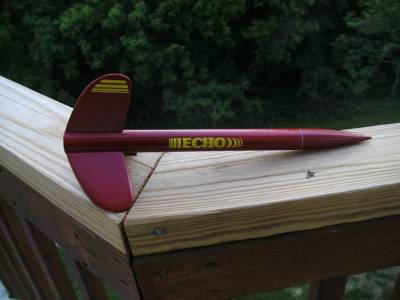 Brief
Brief
The Echo was one of those rockets that Estes seemed to produce as catalog filler in the mid-80's. Unless you were looking for a very specific color or style of 3fnc bird, there was a good chance you'd look this one over, but it was more than it appeared. As a minimum diameter rocket for 18mm engines, the Echo would very likely scream to great heights with the rounded, forward swept fins, making it more than worth the price of admission. A great small field flier on 1/2A and A motors, the Echo would likely need a large field and calm winds for a B motor and a square mile with a dead calm for a C.
That said, I built one because I got a decal in an Ebay decal lot.
Components
- 7 2/4" BT-20 Body tube
- PNC-20N nose cone
- BT-20 engine block
- launch lug
- shock cord
- streamer
Construction
This is a kit you can build in your sleep. Sand and shape the fins, attach them to the body tube, (I used Elmer's wood glue,) glue on the launch lug, glue in the engine block and attach the shock cord and streamer. That's the basic version. I went a to a little more trouble by attaching the shock cord to a piece of Kevlar that I tied around the engine block before gluing it in place.
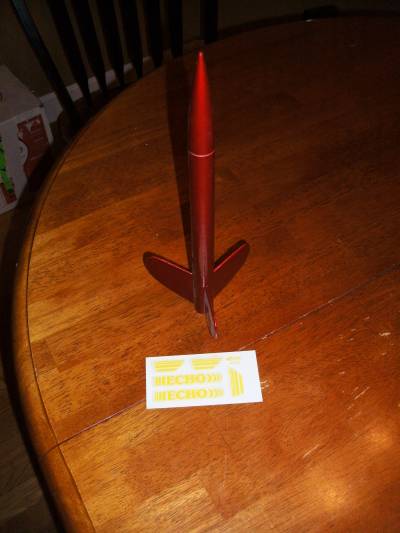
Finishing
With the tube spirals and balsa grain greatly eliminated by Elmer's Fill & Finis, (now sold as Elmer's Carpenter's Wood Filler,) I had to make a color choice. The stock color for the Echo was purple, but the combination of purple paint with the yellow decal would have given me high school nightmares. (Go Camels.) Instead, I decided on Testors Candy Apple Red, a color I'd been impressed with since seeing how the nose cone for my Vector G came out. Since Testors paint had been known to react badly to some primers, I bought a can of Testors white primer. When that had dried I sprayed a base coat of Testors Metallic Silver, then the Candy Red. I went a little heavy on the red, so it just looks like Candy Red, unlike the Vector G, where it very much popped with the silver underneath it. The decals were originals that I won in an Ebay auction. They applied well and looked great. (Not all vintage decals react so well to storage.)
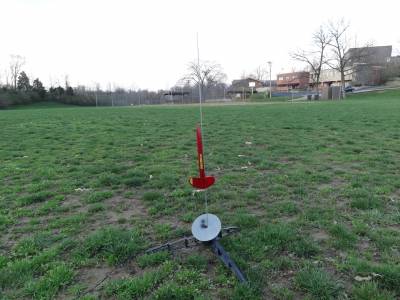
Flight
The Echo was one of the rockets that I chose to fly at the 2012 opening of the flying season at local B6-4 Field. The Echo was the second flight of the night, and with the tight confines of B6-4 Field, the slight breeze blowing toward US 27, and the approaching darkness, I felt comfortable with nothing larger than an A8-3 for the flight. I ran a couple of wraps of tape around the motor, then taped it to the body tube where it protruded. No way this one was going to spit the motor.
With no one else in attendance, I decided to forgo the countdown and insted devote my attention to trying to capture a launch shot. SUCCESS!!! As expected, the Echo left the pad quickly. The A8-3 was PLENTY of motor and I was immediately glad that I'd decided against the B6-4. The flight was almost dead straight, ejection occurred just as it appeared to be ready to tip over, and it spit the motor. Great.
I noticed that the camera had already cycled through the burst shots of the liftoff, so I fired off a few quick shots as the Echo approached earth just behind second base, just in case they were the last shots I'd get of it airborne. The nose cone had exited and could be seen flopping around to the side of the body tube with the streamer still stuck in the body. I never like to see a rocket nose in, even the little ones, and I have to admit to flinching a bit as it impacted the grass. As it bounced I pulled the key, safed the pad, and went to check out the carnage. When I arrived at the crater I was surprised to find that there wasn't one. The Echo was laying just as it had looked on the way down, with the nose cone off to the side and the streamer stuck. Not a mark on the body tube. I'm sure the recent rains had something to do with that, as well as the batch of clover that had cushioned the blow. As a result the Echo will fly again at B6-4 Field during the 2012 launch season.
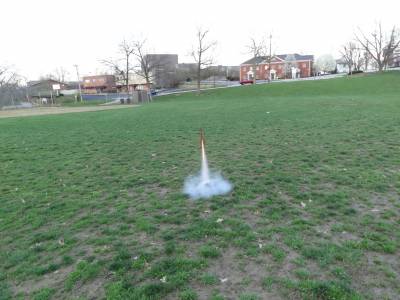
Recovery
Well, the streamer caught in the body tube, but I'm fairly sure that was a result of the engine spitting at ejection and the possible over-use of streamer material by me. On the next flight I plan to swap in some Mylar streamer material that I've been collecting from work. They're short strips of Mylar, so I plan to staple two or three together in the middle to form something of a reverse parachute. The Echo is a light bird, so experiments like this are possible if the landing area isn't concrete.
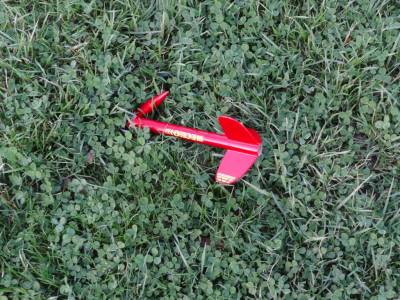
Summary
Pros: Good looking altitude bird that allowed me to use one of the vintage decals in my collection. No motor hook to ugly up the cool lines.
Cons: I need to lighten up on the streamer material. No motor hook to keep the engine in place at ejection.
Related Products
 |
 |
Flights
 |
 |
Sponsored Ads
 |
 |
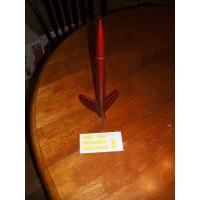
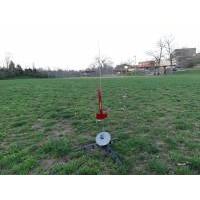
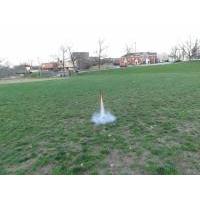
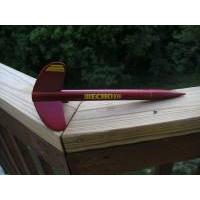
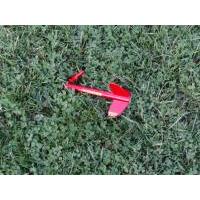












Mark Van Luvender (September 18, 2012)
This was the 3rd rocket I ever built back in my first stint in rocketry, and you're right - it's an absolute screamer! LOVE this kit! As for spitting the motor - mine did that alot too (usually without the nose coming in, so it would streamline in and stick in the ground....typically not too far from where I stood. I realized I had the wadding WAY too tight. Started ripping the wadding in half, and it works like a charm now. Great clone!